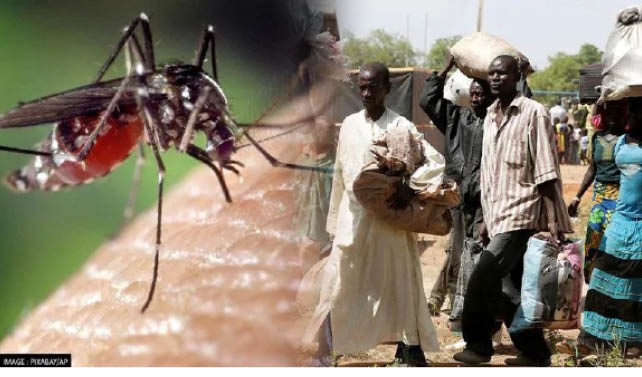Yellow fever is an acute viral hemorrhagic illness caused by the yellow fever virus, an RNA virus that belongs to the family, Flaviviridae.
The virus is found in tropical and subtropical areas of Africa and Central/South America with the illness being endemic in 34 African countries (including Nigeria) and 13 Central and South American countries.
The earliest recorded epidemics occurred in Barbados, Cuba, Guadeloupe and Mexico between 1647 and 1649. There were subsequent outbreaks in North America and Europe between the 17th and 19th centuries.
Yellow fever remains a disease of significant public health importance despite the availability of a safe and efficacious vaccine, with an estimated 200,000 cases and 30,000 deaths annually globally.
Large epidemics occur when people infected with the virus introduce it into heavily populated areas with high mosquito density and where most people have little or no immunity from vaccination or prior infection.
The earliest outbreak of yellow fever in Nigeria was reported in Lagos in 1864, with subsequent regular outbreaks reported up till 1996. For 21 years, no further confirmed cases were reported until September 2017, following which Nigeria has been responding to successive outbreaks.
Just this week, NCDC Yellow Fever Situation Report showed that “Cumulatively from 1st January 2022 to 31st July 2022, a total of 1,179 suspected cases have been reported from 416 LGAs in 36 states including the FCT”, with 14 deaths in 10 states.
Borno, Jigawa and Katsina states reported the highest cases at 100, 81 and 81 respectively while Lagos reported four cases, being the state with the lowest suspected cases of yellow fever. The 14 deaths occurred in Abia (1), Bayelsa (1), Benue (1), Imo (1), Kaduna (1), Katsina (2), Kebbi (1), Taraba (2), Yobe (1) and Zamfara (3).
Signs and symptoms
Reports have shown that once contracted, the yellow fever virus incubates in the body for 3 to 6 days. Some of the symptoms a patient will experience,, according to NCDC, include yellowness of the eyes, sudden fever, loss of appetite, headache, nausea or vomiting and body pain.
However, a small percentage of patients enter a second, more toxic phase within 24 hours of recovering from initial symptoms. High fever returns and several body systems are affected, usually the liver and the kidneys.
In this phase, people are likely to develop jaundice (yellowing of the skin and eyes, hence the name ‘yellow fever’), dark urine and abdominal pain with vomiting.
Bleeding can occur from the mouth, nose, eyes or stomach. Half of the patients who enter the toxic phase die within 7 to 10 days.
Prevention
Vaccination is the most important means of preventing yellow fever according to the World Health Organisation. The yellow fever vaccine is safe, and affordable and a single dose provides life-long protection against yellow fever disease. A booster dose of the yellow fever vaccine is not needed.
Several vaccination strategies are used to prevent yellow fever disease and transmission: routine infant immunization; mass vaccination campaigns designed to increase coverage in countries at risk; and vaccination of travelers going to yellow fever endemic areas.
People who are usually excluded from vaccination include infants aged less than 9 months; pregnant women – except during a yellow fever outbreak when the risk of infection is high; people with severe allergies to egg protein; and people with severe immunodeficiency due to symptomatic HIV/AIDS or other causes, or who have a thymus disorder.
The NCDC has said the vaccine is available for free in primary health care centres in the country as part of the national childhood routine immunization schedule.
In accordance with the International Health Regulations (IHR), countries have the right to require travelers to provide a certificate of yellow fever vaccination.
Also, the risk of yellow fever transmission in urban areas can be reduced by eliminating potential mosquito breeding sites, including by applying larvicides to water storage containers and other places where standing water collects.
Both vector surveillance and control are components of the prevention and control of vector-borne diseases, especially for transmission control in epidemic situations. For yellow fever, vector surveillance targeting Aedes aegypti and other Aedes species will help inform where there is a risk of an urban outbreak.
Personal preventive measures such as clothing minimizing skin exposure and repellants are recommended to avoid mosquito bites. The use of insecticide-treated bed nets is limited by the fact that Aedes mosquitoes bit during the daytime.
Lastly, WHO recommends that every at-risk country have at least one national laboratory where basic yellow fever blood tests can be performed.
Treatment
The Centre for Disease Control advises good and early supportive treatment in hospitals to improve survival rates. Though it is acknowledged that there is currently no specific anti-viral drug for yellow fever, specific care should be given to treat dehydration, liver and kidney failure and fever. Associated bacterial infections can be treated with antibiotics it noted.
This explainer was produced in partnership with the Centre for Democracy and Development (CDD)




